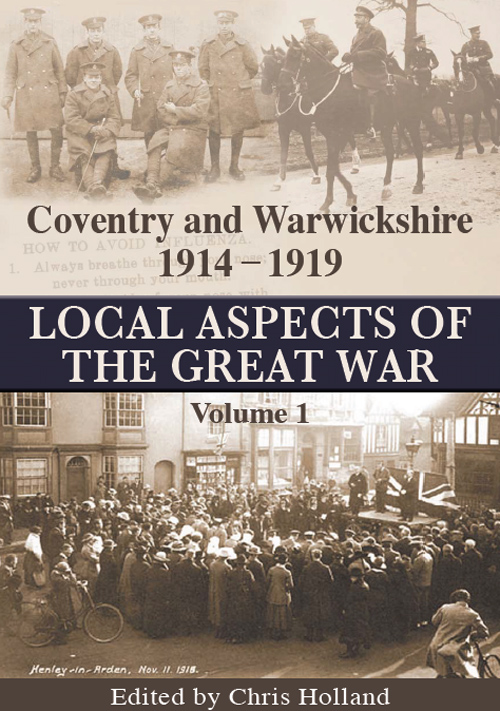Coventry and Warwickshire 1914-1919: Local Aspects of the Great War
Review

Coventry and Warwickshire 1914-1919: Local Aspects of the Great War, Vol.1, [ed] Chris Holland, Warwickshire Great War Publications, 2012, 146p, £9-95. ISBN 978-0-9574216-1-5. Obtainable from Chris Holland, Plott Bungalow, Plott lane, Stretton on Dunsmore, Rugby CV23 9HR.
This is the first volume, with at least one more to follow. It is a work of meticulous scholarship on the part of the eight contributors, led by Chris Holland. Professor Alan Everitt always asserted that, rather than local history being national history writ small, local history could contribute to the re-writing of national history. This book begins with the local response to the outbreak of war: the urgency and scale of the response does rather contradict the widely held view that most people only became aware of the impact of the international crisis at the last moment. The rapid and co-ordinated responses of public services, local government, voluntary organisations and the wider community rather point to an inherent awareness of what was happening and what might happen.
Of course the invasion of Belgium by Germany is at the heart of Britain's declaration of war on 4 August and a chapter on how Belgian refugees were received and treated in Coventry, Rugby and Kenilworth is a testimony to the good-hearted atmosphere that was exhibited at the time. Conversely the decision of the German-born, but naturalised British Mayor of Coventry to not seek a second term as Mayor is also indicative of how high feelings ran at the time. Further chapters consider recruitment, billeting, hospital care, industrial and food production, the Spanish influenza outbreak and the work of the tribunal at Stratford-upon-Avon which examined claims for exemption from conscription from 1916.
At every point this book can be used at two levels: it is clearly of particular interest to anyone wanting to know what happened in Warwickshire during the Great War but it also provides an approach for anyone from further afield who needs a ‘model' on which to base their own local research; and indeed each of its focuses would also make a good contribution to assembling a national picture, based on local experiences.

